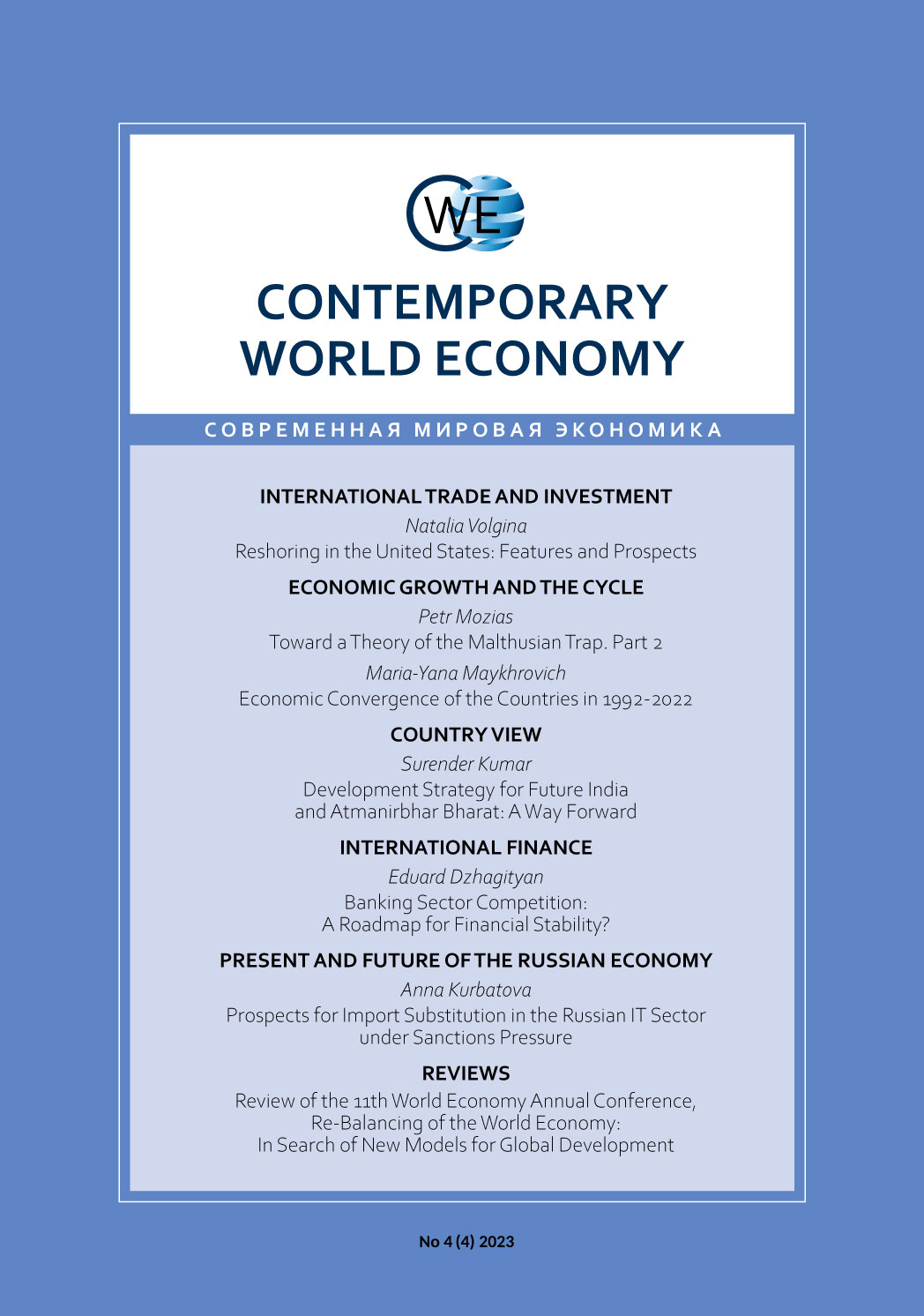Reshoring in the United States: Features and Prospects
Abstract
The phenomenon of reshoring, which refers to the relocation of production facilities from a parent company to the country of origin, is a well-known business practice. The current geopolitical climate, characterized by heightened trade tensions between the United States and China, as well as the global pandemic, has significantly spurred the widespread use of reshoring in the global economy. This has also led to a surge in research attention on these processes. The objective of this paper is to analyze the trends of reshoring in the United States, based on the examination of a number of indicators, including the AT Kearney Index, to identify the various forms of reshoring activity of companies. As a result of this research, the author reaches the following conclusions: The dynamics of the US reshoring index suggest that the return of industrial production from China to the US has not yet occurred at a significant scale. At the same time, there is a transfer of production from China, but not in the form of classical reshoring “back to the United States,” but to Asian countries proximate to China. The diversification of US industrial imports is becoming increasingly evident. While the share of imports from China is falling, the share of imports from alternative Asian countries (Altasia), including Vietnam, Taiwan, India, Malaysia, Thailand, and others, is rising. At the same time, the value of US industrial imports from Asian countries, including China, is increasing. In addition to the relocation of US manufacturing imports from China to Latin America, there is clear evidence of nearshoring, the transfer of production capacity to countries in the region that are geographically close to the United States. Mexico, in particular, has emerged as a prominent destination for both US and Chinese firms seeking to relocate production. In the context of reshoring, a growing number of companies are adopting a “right reshoring” model, which involves abandoning the search for the lowest-cost locations in favor of “best cost” locations. These locations prioritize sustainability and supply chain reliability in addition to cost. We believe that the trend towards “right reshoring” will intensify in light of the US economic policy in this area, which aims at more active government intervention to support domestic production under the “Made in the USA” label.
Downloads
References
AT Kearney, 2015. US Reshoring: Over Before It Began? Available at: https://www.AT Kearney.com/documents/10192/7070019/US+Reshoring.pdf
AT Kearney, 2021. Global pandemic roils 2020 Reshoring Index: shifting focus from reshoring to right-shoring. Available at: https://www.kearney.com/operations-performance-transformation/us-reshoring-index
AT Kearney, 2022. The tides are turning. The 2021 Reshoring Index. Available at: https://www.kearney.com/consumer-retail/article/-/insights/the-2021-reshoring-index-the-tides-are-turning
AT Kearney, 2023. America is ready for reshoring. Are you? The 2022 Reshoring Index. Available at: https://www.kearney.com/service/operations-performance/us-reshoring-index
Barbieri P. et al., 2020. What can we learn about reshoring after Covid-19? Operations Management Research. Vol. 13. P. 131-136. Available at: https://doi.org/10.1007/s12063-020-00160-1
Boston Consulting Group, 2012. Made in America, Again: US Manufacturing Nears the Tipping Point. Which Industries, Why, and How Much? Available at: https://www.bcg.com/publications/2012/manufacturing-supply-chain-management-us-manufacturing-nears-the-tipping-point
Chen, H., Hsu, C. W., Shih, Y. Y., Caskey, D., 2022. The Reshoring Decision under Uncertainty in the Post-COVID-19 Era. Journal of Business and Industrial Marketing. Vol. 37. No 10. P. 2064-2074. Available at: http://doi.org/10.1108/JBIM-01-2021-0066
De Backer K. et al., 2016. Reshoring: Myth or Reality? OECD Science, Technology and Industry Policy Papers. No. 27. Paris: OECD Publishing. Available at: http://dx.doi.org/10.1787/5jm56frbm38s-en
European Reshoring Monitor. Available at: https://reshoring.eurofound.europa.eu/research-team
Jaax, A., Miroudot S., van Lieshout E., 2023. Deglobalization? The reorganization of global value chains in a changing world. OECD Trade Policy Papers. No. 272. Paris: OECD Publishing. Available at: https://doi.org/10.1787/b15b74fe-en .
Geneva Business News, 2018. Trade Wars and Global Supply Chains. Nov. 30. Available at: https://gbnews.ch/trade-wars-and-global-supply-chains
Gereffi, G., 2019. Economic Upgrading in Global Value Chains. In: Handbook on Global Value Chains. Edward Elgar Publishing. Available at: https://doi.org/10.4337/9781788113779.00022
Global Value Chain Development Report, 2023. Resilient and Sustainable GVCs in Turbulent Times. Available at: https://www.wto.org/english/res_e/publications_e/gvc_dev_rep23_e.htm
Goodman, P.S., 2023. Why Chinese Companies Are Investing Billions in Mexico. The New York Times. Feb. 3. Available at: https://www.nytimes.com/2023/02/03/business/china-mexico-trade.html
Kinkel S. et al., 2017. Measuring reshoring trends in the EU and the US. Available at: http://www.makers-rise.org/wp-content/uploads/2018/02/D4.1-Measuring-reshoring-trends-in-the-EU-protected.pdf
Manufacturing Institute, 2020. Annual Report. Available at: https://themanufacturinginstitute.org/2020-annual-report/
Moradlou, H., Backhouse C.J., 2016. An investigation into reshoring decisions: a case study approach. 14th International Conference on Manufacturing Research, Loughborough University. P. 439-444. Available at: https://ebooks.iospress.nl/publication/44389
Morrison, W.M., 2019. China’s Economic Rise: History, Trends, Challenges, and Implications for the United States. Available at: https://www.everycrsreport.com/reports/RL33534.html
OECD. Inter-Country Input-Output (ICIO) Tables. Available at: https://www.oecd.org/sti/ind/inter-country-input-output-tables.htm
OECD, 2022. International Direct Investment Statistics. Available at: https://www.oecd-ilibrary.org/finance-and-investment/oecd-international-direct-investment-statistics-2022_deedc307-en
PricewaterhouseCoopers, 2014. UK Economic Outlook. Reshoring—A New Direction for the UK Economy. Available at: https://www.pwc.com/im/en/publications/assets/ukeo-july14.pdf
Reshoring Initiative. Available at: www.reshorenow.org
Reshoring Institute. Available at: https://reshoringinstitute.org/
The Economist, 2023. These Countries Could Lure Manufacturing away from China. Call them “Altasia.” March 3. Available at: https://www.economist.com/graphic-detail/2023/03/03/these-countries-could-lure-manufacturing-away-from-china
The White House, 2021. Executive Order on America’s Supply Chains. Available at: https://www.whitehouse.gov/briefing-room/presidential-actions/2021/02/24/executive-order-on-americas-supply-chains
The White House, 2022a. Inflation Reduction Act. Available at: https://www.whitehouse.gov/cleanenergy/inflation-reduction-act-guidebook/
The White House, 2022b. The CHIPS and Science Act. Available at: https://www.whitehouse.gov/briefing-room/statements-releases/2022/08/09/fact-sheet-chips-and-science-act-will-lower-costs-create-jobs-strengthen-supply-chains-and-counter-china/
The White House, 2023. Executive Order on Addressing United States Investments in Certain National Security Technologies and Products in Countries of Concern. Available at: https://www.whitehouse.gov/briefing-room/presidential-actions/2023/08/09/executive-order-on-addressing-united-states-investments-in-certain-national-security-technologies-and-products-in-countries-of-concern/
Timmer, M. P., Los, B., Stehrer, R., De Vries, G. J., 2021. Supply Chain Fragmentation and the Global Trade Elasticity: A New Accounting Framework. IMF Economic Review. Vol. 69. Available at: https://doi.org/10.1057/s41308-021-00134-8
Timmer, M. P., Los, B., Stehrer, R., De Vries, G. J., 2016. An Anatomy of the Global Trade Slowdown based on the WIOD 2016 Release. GGDC Research Memorandum 162, Groningen. Available at: https://wiiw.ac.at/an-anatomy-of-the-global-trade-slowdown-based-on-the-wiod-2016-release-n-176.html
Vecchi A., ed., 2017. Reshoring of Manufacturing Drivers, Opportunities, and Challenges. Springer International Publishing. Available at: https://doi.org/10.1007/978-3-319-58883-4
Volgina, N.A., 2022. Methodological approaches to the measurement of reshoring processes. In: International Economic Symposium - 2022. Proceedings of International Scientific Conferences March 17-19, 2022: 10th International Scientific and Practical Conference “Sustainable Development: Society and Economy,” 19th International Conference “Evolution of International Trade System: Problems and Prospects,” 28th International Scientific and Practical Conference “Actual Problems of Management: Features of Management in Crisis Situations in Pandemic Conditions” / Ed. coll. by O.L. Margania, S.A. Belozerov. St. Petersburg: Skifia-Print Publishing House, 2022. P. 655-660 (in Russian).



1.jpg)

